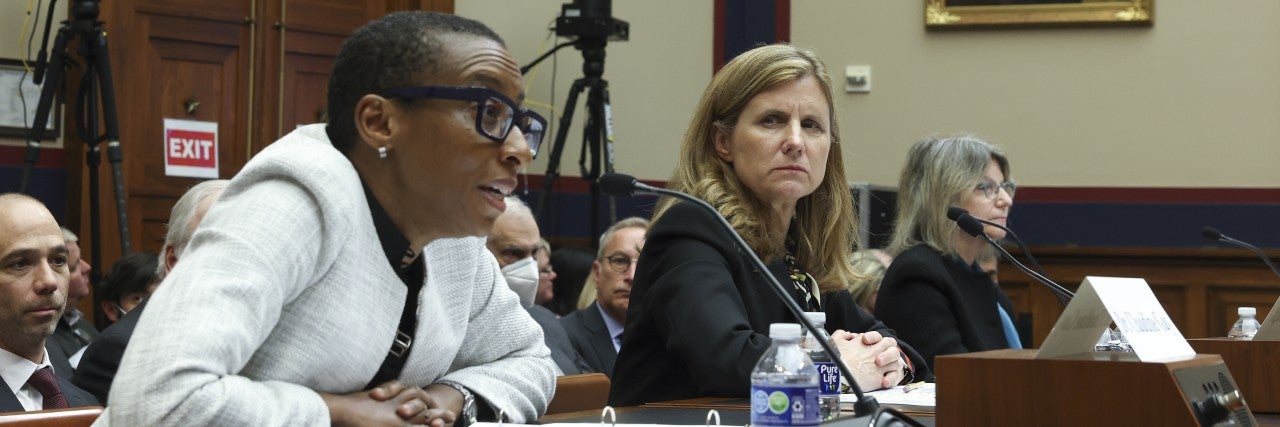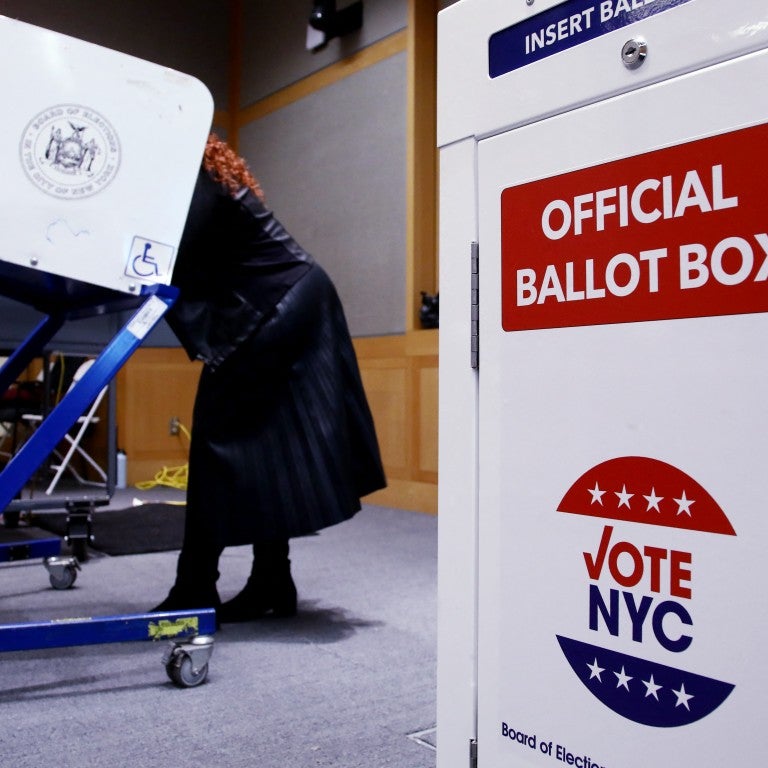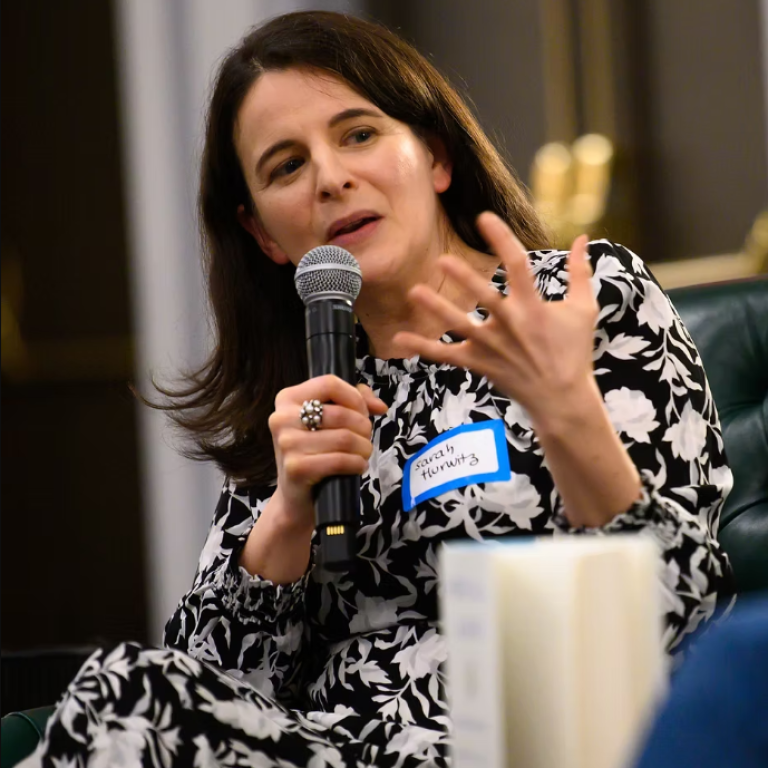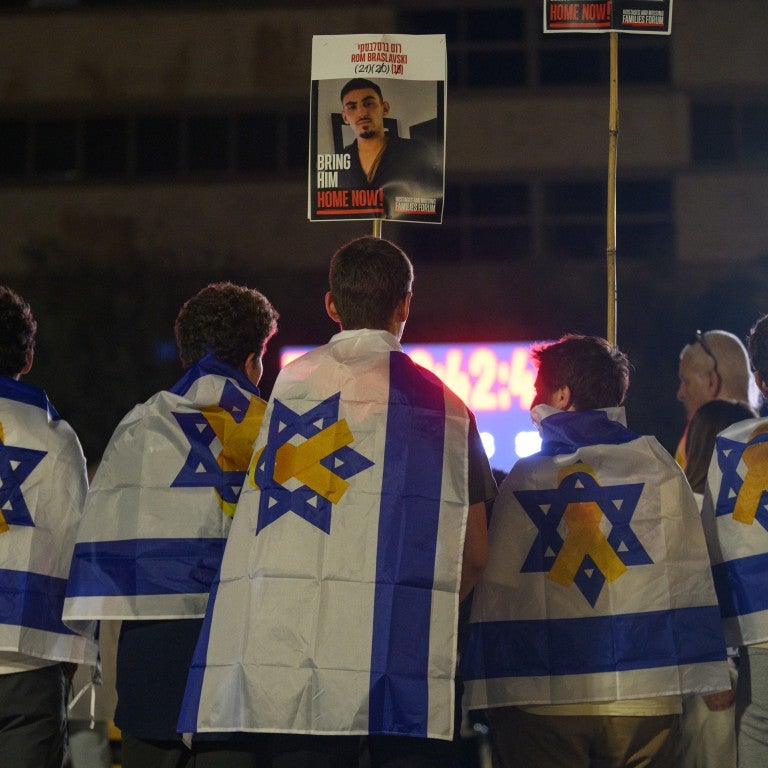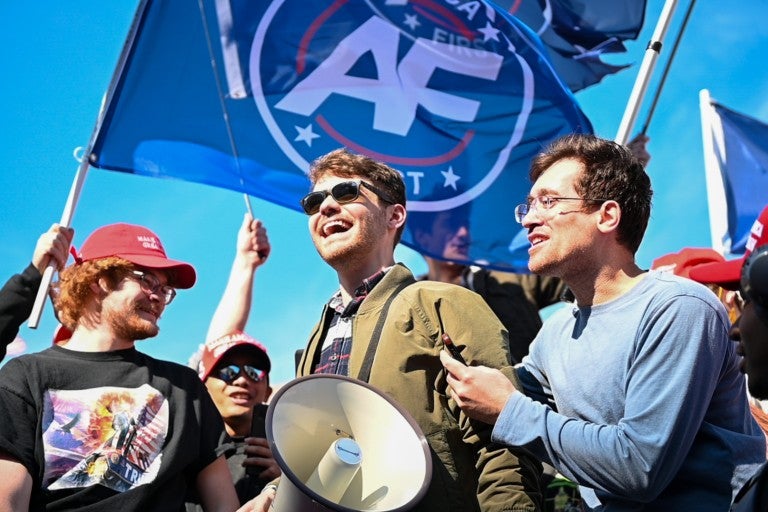December 14, 2023
As American colleges and universities struggle to foster discussions about the war between Israel and Hamas that don't veer into antisemitism and misinformation, three university presidents testified on Capitol Hill about the current state of Jew-hatred on college campuses. However, their testimony drew widespread outrage over their refusal to condemn calls for genocide against Jewish students. AJC Director of Academic Affairs Dr. Sara Coodin, and AJC Director of Contemporary Jewish Life, Dr. Laura Shaw Frank join us to break down the fallout and give us a broader view of how university leaders are handling this situation.
*The views and opinions expressed by guests do not necessarily reflect the views or position of AJC.
Episode Lineup:
- (0:40) Avital Leibovich
- (1:44) Sara Coodin, Laura Shaw Frank
Show Notes:
AJC has been working nonstop to support Israel, combat antisemitism, and safeguard Jewish communities worldwide. To support our work today, you can visit AJC.org/donate. Or text AJC DONATE to 52886.
Listen:
Learn:
- AJC Campus Library: Resources for Becoming a Strong Jewish Student Advocate
- A Toolkit for University Administrators: Confronting Campus Antisemitism: An Action Plan for University Administrators
Follow People of the Pod on your favorite podcast app, and learn more at AJC.org/PeopleofthePod
You can reach us at: peopleofthepod@ajc.org
If you’ve appreciated this episode, please be sure to tell your friends, and rate and review us on Apple Podcasts.
Transcript of Interview with Sara Coodin and Laura Shaw Frank:
Manya Brachear Pashman:
Since the horrific October 7 terrorist attack on Israel by Hamas and the start of Israel's counter offensive, American colleges and universities have been struggling to encourage fact based debates and demonstrations that don't veer into antisemitism and misinformation. University presidents have issued and reissued statements that originally missed the mark, and presidents from three of the nation's top universities appeared on Capitol Hill for congressional inquiry that led one to resign and put another in jeopardy. Here to discuss that inquiry and give us a broader view of how university leaders are handling this crisis is Dr. Sara Coodin, AJC’s Director of Academic Affairs, and Dr. Laura Shaw Frank, AJC's Director of Contemporary Jewish Life.
Laura, Sara, welcome to People of the Pod.
Sara Coodin:
Thank you.
Manya Brachear Pashman:
I want to start with the testimonies by three university presidents last week: Claudine Gay at Harvard, Elizabeth McGill at the University of Pennsylvania and Sally Kornbluth at MIT. Since that, since their appearance on Capitol Hill, President McGill has resigned. And President Gay has survived a debate over whether to oust her from Harvard. For those listeners who didn't follow those hearings, Sara, you were there, right? Can you summarize for us what happened?
Sara Coodin:
I was there, and I have to say I was really quite surprised that it went on for as long as it did. There were close to six hours from start to finish. And the kind of publicity that followed over their inability, all three of them to respond to those very pointed and basic questions by Representative [Elise] Stefanik, really happened in the 11th hour. And there was a lot that happened before. There were a lot of important questions and points that were raised before that kind of pivotal moment in the hearings. So I just want to say that, because for those of us who were sitting in the room and listening and watching, there was a lot to sit through. And there were a fair number of questions that emerged that were very on point.
And I think as direct as Representative Stefanik’s questions were, there were questions about the ability of these universities to access considerable resources. Harvard sits on a $50 billion+ endowment, 350+ years of history, and tens of thousands of faculty. So one of the questions that emerged was, why haven't they been able to address this up until now? What's new in the present commitment?
And I think for me, that was a really central question. Because these are some of the most recognized elite and well endowed universities, in a country that prides itself on excellence in higher education. These are the most excellent of the excellent. So what gives? When they've suddenly decided that this is a huge problem, they're devoting their considerable resources to addressing it.
But you know, to do that, convincingly, I think they have to respond to the fact that this is not something that emerged overnight. This is not something that happened simply in the wake of October 7. It's been brewing for a long time. So why the institutional silence, or turning away from these questions and issues up until now? I think that for me, it was one of the key takeaways before that moment where they were not actually able to respond in any kind of real way to that question about codes of conduct, which in a way is a very limited, very specific question. But I think their inability to come up with a convincing set of arguments and proposals for how they're going to address antisemitism on their campus, either programmatically or through structural innovations, like codes of conduct. You know, people left with very little to take away, there were very few takeaway moments for me in terms of convincing, really proactive measures that they were willing to take that could address the culture problems on their campus.
Manya Brachear Pashman:
Of course, you mentioned the pointed questions by Representative Stefanik. You’re talking about her question about, does a call for the genocide of Jews violate the university's Code of Conduct? The presidents really stumbled to answer those questions kind of unequivocally and unequivocally denounce the mass murder, or calls for the mass murder of Jews.
They kept turning back to free speech, right, and academic freedoms on campus and prioritizing that instead. Was that your takeaway?
Sara Coodin:
I think that they had prepared for a series of responses that were very suitable for a court of law. And I think they weren't prepared to respond to the court of public opinion, which is essentially what happened. I mean, enough people were paying attention to that hearing, and have their eyes on these universities and on this particular set of problems that's made national headlines.
Before this December hearing, they should have been prepared, frankly, they should have spoken to members of the Jewish community, including representatives from AJC to address what the concerns really are, from our side of things. They seemed very well prepared to defend a very narrow, legalistic notion of what free speech is, of where it starts and where it begins. That is not incorrect. It's not an inaccurate description. But it's one that really misses the larger point.
And I think the directness of those questions by Stefanik, and others, was really a kind of shot, where it where it hurt, you know, because they they weren't able to respond to those basic queries that I think really picked up on some of the basic questions that we have for the schools and for these leaders. What are you doing? And why are you so unable to draw a basic line in the sand that condemns something with a degree of moral clarity that seems convincing? Why can't any of them do that? So I think that's what that question became.
Manya Brachear Pashman:
Did you feel like the journalists who covered this hearing also got that? I mean, you talked about six hours of discussion, and really the stories about the hearing focused on that 11th hour, those really, very pointed questions. But did you feel like the coverage really got to the heart of this issue? And perhaps could lead to some constructive conversations going forward or not necessarily?
Sara Coodin:
I mean, there were some interesting moments. All three university leaders condemned antisemitism at the outset of the hearing, they were asked in a very direct fashion, Do you condemn antisemitism? Yes, yes, and yes.
They were asked whether they stood in support or opposition to BDS resolutions, or to BDS full stop, and two of the three had time to answer and said, we do not support BDS. So that's also significant that they expressed that to hear a top university leader actually say those words is meaningful. Because we've seen, of course, last year with the Harvard Crimson editorial, where, you know, they came out and support of BDS. So to hear the leader of Harvard actually condemn it, and say, This is not represent our position, our perspective. That's significant.
That being said, you know, having sat through the first three hours, or whatever it was, before they broke for a recess, what were the key takeaways up to that point where they had nothing to say and just sort of stumbled? Not terribly many, they seem to be sticking to a very set number of talking points, very clearly focused on saying, you know, free speech matters on campus, which means something that can include hate speech, and unless it turns into conduct behavior, there's nothing we can do. There's nothing we’re willing to do.
That was the line and they repeated it and they kept doubling down on it up to the point where they continue to double down on it in response to Stefanik’s question. There was a lot of it, too much of that and not enough of the kind of responses that I think we were all wanting and needing to hear from these university leaders.
Laura Shaw Frank:
I wanted to just note that the first headline that I saw about the hearings is from the New York Times, which said, Republicans tried to put Harvard, MIT and Penn on the defensive about antisemitism. And to be honest, I just was like, they're really going to make this about a political fight, and not actually engage with the antisemitism question itself. And I actually found that to be quite a horrifying headline.
It felt so egregiously ignorant, and also ignoring the substance, the very real substance of what was trying to happen and what people were trying to get at in that room. So I was really upset by that. And then afterwards, shortly afterwards, there was another headline, which I guess they noticed themselves that they had missed the mark and published another article, some of the same journalists, were the authors of that article, the second piece called college president, the headline was college presidents under fire, after dodging questions about antisemitism. So I thought that was a pretty big turnaround, where they all of a sudden realized, Oh, we really can't make this into a Republicans versus Democrats thing here. This is actually about something much more substantive, much deeper, and much more bipartisan.
Manya Brachear Pashman:
You said Sara that the hearing the leader of Harvard denounced that BDS is significant. These are kind of influencers, if you will, these three elite schools, they're influencers in academic circles. But can you give us a broader view about what's happening? You know, we've spoken to Jewish student leaders about what they and their peers are experiencing, but you work with administrators and faculty. I'm curious, from their point of view on smaller liberal arts campuses, state schools, community colleges, what are you? What are they saying? What are you hearing from their point of view?
Sara Coodin:
I think the schools that think of themselves as being part of the Harvard Extension orbit, you know, they're not quite Harvard, but they're aspirants to Harvard, they maybe have some of the same students that also applied to Harvard. They've really got their eyes fixed on public perception right now about university leadership. So they're scared frankly, I think they're worried that the next incident that's going to strike their campus is going to produce a moment that may may result in their their ouster, you know, in their being kicked to the curb, because if it can happen at the University of Pennsylvania, it can happen anywhere. And we're dealing with a large cohort of incoming presidents, all three of the presidents who testified before Congress, we're in the first year of their presidency. And that's actually not as unusual as it sounds, there's been a kind of a revolving door syndrome for about a decade now, where these positions used to be for, you know, 20-30 years, you'd have presidents sitting in these positions, no more.
And so we're seeing a rash of new, I will say, an experience, but new to their roles at their current campuses, university president at a lot of schools, including places like GW, where I think there's a real concern about this being a kind of formative moment for them that shapes the perception of who and what they are about as university leaders.
So I think there is an awareness now that in the post-statement moment, where everyone was called upon to make these amazing, pointed, clear statements, and most university presidents failed, that this, this is potentially, you know, a series of tests for them, where there there can be real failure, you know, and they've seen what that looks like on the public stage.
I think when it comes to very small colleges, they tend to operate in their own little worlds, right, their own little bubbles. And there's often a perception that the kind of media focus is not an important factor. But I think we've seen enough lawsuits being filed, enough title six complaints, to know that that's just not the world that any of these campuses are functioning in anymore. And there's more and less resistance to that as part of the new landscape. The fact is, you know, the media attention to these issues means that no one is really free to operate in an insular bubble anymore.
So I think that in itself might create a kind of extended series of real deliberations on the part of administrations before they issue statements before they jump into the fray. I don't know that that's a bad thing. Thoughtfulness is good. Thoughtfulness, with a concern about messaging, you know, maybe that'll be good for the university community, maybe not. There's an argument that maybe that's not the best thing to actually solve the problem, because the problem can't be solved with messaging. It has to be solved through innovative programming through looking at things like student codes of conduct. And some schools, to be perfectly honest, seem very content to remain exactly the kinds of anti-Zionist micro-climates that they've been for years now.
Manya Brachear Pashman:
Can you give us a couple of examples of those campuses, but also some encouraging examples as well?
Sara Coodin:
You know, a lot of the smaller liberal arts schools in the northeast and Massachusetts, in New York State have had that reputation for a long time, including schools where the leaders themselves are actually really committed to trying to do something. So Wellesley is a perfect example of that. And the President of Wellesley, Paula Johnson, traveled to Israel with us this last summer. She's wonderful. She's incredibly thoughtful. She was such a formative figure to have on that trip, wouldn't you say, Laura?
Laura Shaw Frank:
Absolutely. She's an incredible president to have on the trip, who took in everything that we did with such humility and wisdom and an eagerness to learn. And she's an incredible partner for us, and at the same time for campus is a really tough place to be a Zionist. A president can't control fully, and certainly can't overturn in a minute of campus climate.
Sara Coodin:
They're under a title six investigation now. There's a set of ingredients there, and a pretty recent history of a bit of an echo chamber syndrome on that campus. It's really tough when you have a small school where already there's a concentrated number of voices, and they don't include a kind of diverse range of questions about Israel and Zionism.
So that's not a very good recipe for inclusion, or for Jewish students who want to go and be themselves and represent their identities as Zionist fully. By all accounts, there are a lot of schools–small ones, particularly–that can foster those kinds of climates that are really not great for Jewish students. And it's a bit of a puzzle when you have a small institution where every voice matters, but there's too much agreement about Israel and Zionism. So there's no real conversation. There's no way to kind of generate real dialogue because there's no one willing to give voice to an unpopular position.
Manya Brachear Pashman:
And are there heartening examples?
Sara Coodin:
You know, there are and I’'m going to name another school whose president we took to Israel this summer, Julio Frank of the University of Miami. I want Laura to speak to this particular example because she has a personal connection to that school now.
Laura Shaw Frank:
Absolutely, I would love to speak about the University of Miami. So Julio Frank was just also such a wise and present member of our trip to Israel this past summer. He just drank it in with such depth of character and thought, and has kept the University of Miami as a campus that– look, I don't know what it was like before. My personal connection to it is that my son is a student in their very wonderful bachelor of fine arts conservatory program in musical theater.
So I hear from my son all the time, about how things are on campus. How does he feel as a Jew on campus? And he says, it's totally fine. Peaceful, wonderful. There is an SJP-like group, but it is a moderate group. It is a fairly quiet group. It has not interfered with Jewish students' ability to get everything they need to get out of their education. The Hillel and Chabad are both very active. And President Frank has spoken very, very clearly, both in his initial statement after October 7, and also in joining the Yeshiva University coalition statement, as one of the founding members of it, which was a very, very strong statement.
He's also made a point of speaking on panels together with pillow leadership, like Adam Newman, who's the CEO of Hillel, and has just been a real partner to the Jewish community. He is Jewish himself. He's a Mexican Jew. He's also just a very moral person, he thinks very deeply about morality. He's actually a public health person and in his scholarship. And the University of Miami, I would say this has been a real model campus in terms of keeping the atmosphere, free of harassment, against Jews, and really with clear moral leadership from the top.
Manya Brachear Pashman:
You know, Sara, you mentioned having very few takeaways after three hours of congressional hearing largely because it was political theater versus talking points. I am curious, what kinds of thoughtful conversations are unfolding on campuses? Is there any kind of dialogue healthy, open, maybe sometimes angry, but thoughtful dialogue, to move the needle somewhat?
Sara Coodin:
There is. We focused on hate speech so much as the one segment of speech that we should all be concerned about. And we should, but there's so much more to campus speech than just hate speech. There's constructive dialogue across difference, which is a term that anyone working in student-facing administrative roles is familiar with. They're familiar with dialogue across difference, and how crucial it is in today's pluralistic student community. If you want diversity on your campus, you have to figure out how to stage and model those conversations. And they have to be constructive.
So schools like GW have been, you know, slowly starting to implement that kind of programming with the aim of showing incoming students what it looks like. I was part of a panel discussion this fall before, you know, before October, that tried to do exactly this. And it was an amazing model, and it was one that they've done before.
And Laura was part of that rollout, which was for student-facing staff. This was for incoming students. And we just went right into it with different perspectives, different identity positions, and addressed questions about antisemitism and Zionism. And they had a parallel session going on about race and racism, that was equally, forthright, they were not saying let's talk about some version of this as watered down and irrelevant, they went straight for it. And they brought in people who could actually speak authentically to difficult questions. And we didn't agree, we didn't all agree, we didn't have to agree. That's sort of the point.
So I think when it comes to programming, that's the model, is to find ways to bring people into dialogue. That model is something other than just shouting matches, reductive talking points, polarized discourse, all the stuff that's happening in the streets, or, you know, in kind of public spaces of campus. But it's probably not happening enough when it comes to these issues. And I think administrators have been loath to address this in a direct way, in many cases, because they feel like it's too hot. You know, it's too likely to inflame existing tensions, which may be true. But I think showing students through creative programming, what it means to engage on these issues. And if you're really skilled, you can create programs to actually get them involved in ways that make them take ownership of the issues and ownership of their own knowledge.
Laura Shaw Frank:
I want to note that the person behind the GW programs that Sara was talking about is a PI alum as well. And it's Vice Provost Colette Coleman, Vice Provost for Student Affairs, who went to Israel with us in the summer of 2022. And has been an incredible thought partner.
Manya Brachear Pashman:
Some terms, you and Laura were talking about how some terms just don’t have a place on a college campus. Walter Russell Mead, also a previous guest on this podcast, had a column in the Wall Street Journal recently in which he argued this generation of college students has never experienced the toll of a world torn by war. And frankly, this generation of college presidents has largely been spared that experience. Claudine Gay was born four years after teach-ins protesting the Vietnam War began at the University of Michigan.
Do you think that has led to a lack of moral clarity or a situation where maybe the administrators are listening to the students but the students aren’t listening, and aren’t learning, and aren’t fully comprehending consequences of words and actions?
Sara Coodin:
There's always a generational divide in these conversations between faculty, you know, senior faculty, junior faculty, and then students who've grown up with different experiences, their worldview has been shaped by things like new technologies, which simply weren't even a factor, you know, 20, much less 50 years ago.
I think part of the issue that we're seeing is that there is a kind of moment, a very brief one, in the larger context of Jewish history, where were American Jews have experienced a golden age where they haven't, haven't really directly confronted antisemitism, at least not in the overt ways that are so much a part of our history. A lot of American Jews consider themselves to be a pretty seamless part of the fabric of American life and culture writ large. That alone goes quite a long way to understanding some of the issues that we're dealing with on college campuses, where Jewish students might feel like they have no one to turn to, as far as Jewish mentors are concerned, on college campuses, because there's a generation in place, who achieved amazing things.
But I think there was a widespread assumption that there was really no problem that this was a new golden age for American Jews where we could stop thinking about antisemitism as the central defining principle of our culture. And I think we're seeing now, which is something that we've seen many times before, if we take the long view, that antisemitism goes into a kind of dormancy, and then it resurges, and what is old becomes new again, some of the old tropes attach themselves to new social languages, and they acquire a kind of currency that allows people to invest in them and keep promoting them.
We’re dealing with a generation that I am sorry to say in terms of the people who are the permanent residents of campus–the tenured faculty members, the people who are there for life–who seem insulated from the realities that the younger generation are actually dealing with in their social lives and their social interaction with their peers. I think there is a kind of awareness of it on the part of some faculty where they know that there are certain opinions on certain topics that they can't really opine about. Because there's a risk there that the social lubrication that's required to gain acceptance in their field or to have the kinds of conversations they want to have about their subject areas can't happen if they foreground Zionism, if they talk about Jewish identity in certain ways, if they express a certain range of opinions about Israel, so they kind of saw silence, and they see that as a reasonable price to pay.
But I think right now, with the generation of students that's coming up, we're so invested in identity politics as a cornerstone of our identity, that that seems like an unfair trade off, it seems insane to walk into a space that's defined by identity politics, and not be able to talk about yourself as a Jew, and to talk about your relationship to Israel and Zionism, which is such an important part of that for most American Jews.
So I think there is a disconnect there. I think the generation that is older, maybe it's an understanding quite the predicament that young Jews are actually in, because they've found ways to gain advancement in an era where identity politics was not really the current thing. And it's so much is for this generation of students, that they need other tools and better tools to navigate those spaces, conversations, and relationships.
Manya Brachear Pashman:
I want to go back to teach-ins for a moment. We've seen many promoted in recent weeks as educational events and opportunities for dialogue. Are you finding that is indeed the case? Are they spaces for open and constructive conversations, or do they have open and shut agendas? Are teach-ins not what they used to be?
Sara Coodin:
There was one at NYU just this week that was being promoted on other campuses as a zoom event, a must-attend kind of event to help make sense of the conflict in the Middle East. There is nothing balanced or even fact based about the kinds of conversations that are happening in those spaces. And I think it's incredibly dangerous for these kinds of events to be masquerading as educational opportunities for students to learn about a very challenging and very difficult set of geopolitical questions and circumstances. These are not educators who are providing balanced fact-based opportunities for exchange. A lot of these events have taken place and have actually prevented any questions from being raised by people who are sitting on the sidelines and tuning in.
Laura Shaw Frank:
I think that side by side with free speech, our universities need to start focusing on what is responsible speech? What does it mean to use this wonderful right of free speech in a way that's going to be productive for our society, without restricting it necessarily.
Where we can have conversations that are so difficult about verge topics, that are rooted in facts that are rooted also in listening across difference, that are rooted in empathy. And that are rooted in lacking in the opposite of ideological silos that are rooted in ideological diversity. And that's something that we've spoken about on this podcast about how much ideological diversity is lacking, how much reading and facts is lacking, and how much dialogue across difference, the skills for dialogue across difference is lacking. And all of those things in our minds are critical for the future of university campuses, not just just for Jews, but the project of higher education in this country.
And the last thing I would say is, we have to wrap our minds around the fact that there is no quick fix here. We have to dig into some serious work. The campuses have to do it. The administrators have to do it. We are here to partner with them to do it. But this is not going to go away quickly. It took decades to sort of create the toxic situation that we're in, and it's going to take a little bit for us to get out of it. So we have to understand that.
Manya Brachear Pashman
Well, hopefully some progress will have been made by the time my children get to college. Sara, Laura, thank you for joining us.
If you missed last week's pair of episodes, be sure to tune in for a roundup of reports from some of AJC's experts around the world. They shared what efforts are underway to protect Jews and counter the hate that has erupted since the October 7 massacre of Israelis by Hamas.
